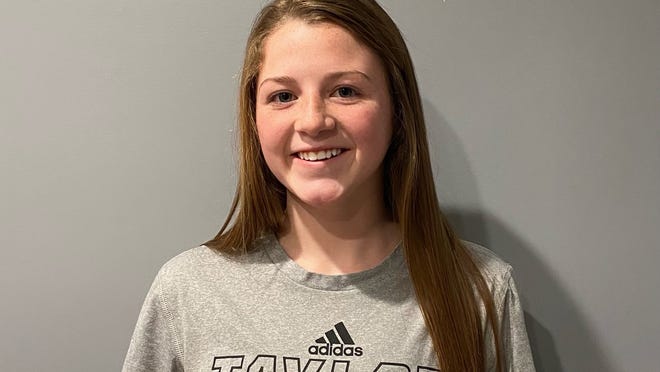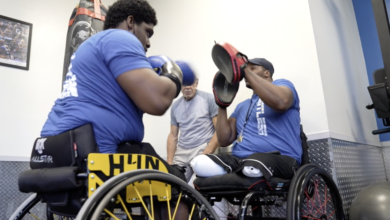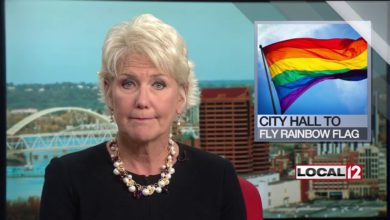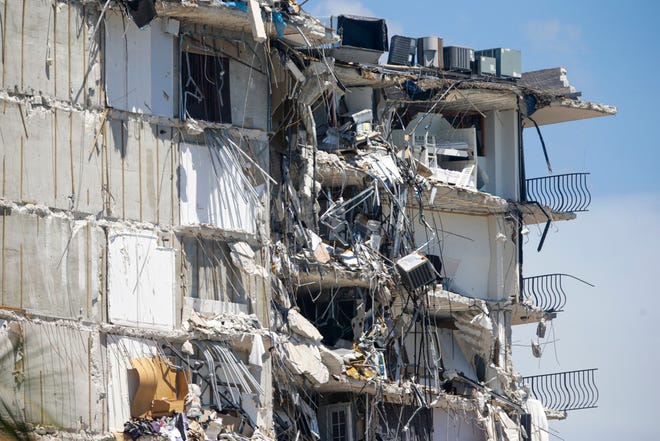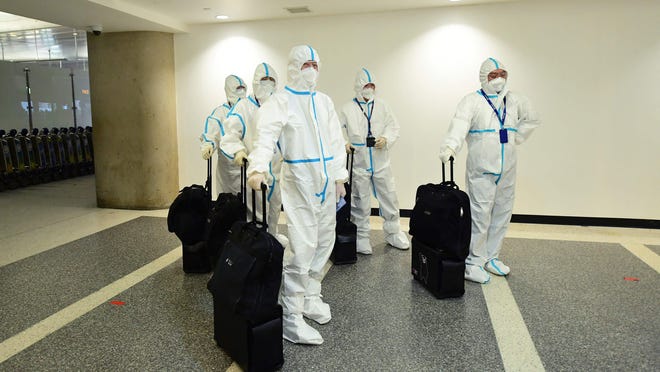
The latest mutation of the coronavirus, omicron, is making headlines across the nation. But the previous severe mutation, delta, is responsible for the soaring number of infections and hospitalizations across the nation.
It's too soon to say what the future holds for omicron. But delta is the present, it is everywhere and it is a big problem.
Dr. Anthony Fauci, President Joe Biden's chief medical adviser, says omicron, first discovered in South Africa last month, "almost certainly is not more severe" than delta.
"There is some suggestion that it might even be less severe," Fauci told Agence France-Presse this week. "When you look at some of the cohorts that are being followed in South Africa, the ratio between the number of infections and the number of hospitalizations seems to be less than with delta."
The delta surge has been driven by a combination of the late fall's colder weather, holiday gatherings, increased travel and pandemic fatigue. A failure to vaccinate a larger portion of the population also is playing a role. More than 35% of eligible Americans, including 28% of adults, still aren't fully vaccinated.
The result: New cases in the U.S. climbed from an average of nearly 95,000 a day on Nov. 22 to almost 119,000 a day this week, and hospitalizations are up 25% from a month ago. The increases are almost entirely from the delta variant, though omicron has been confirmed in at least 21 states and is sure to spread even more.
Deaths are running close to 1,600 a day on average, back up to where they were in October. And the overall U.S. death toll less than two years into the pandemic figures to hit the 800,000 milestone in a matter of days.
Also in the news:
►A Massachusetts man who used stolen identities to fraudulently apply for pandemic-related unemployment benefits has been sentenced to more than three years in prison. Wagner Sozi, 33, was also ordered to pay about $110,000 in forfeiture and restitution, the U.S. attorney’s office in Boston announced.
►About 34,000 students have yet to comply with Los Angeles Unified School District's COVID-19 vaccine mandate. Non-vaccinated students will either have to enroll in the district’s independent study program or leave L.A.'s public school system.
►More than 40 people in the U.S. have been found to be infected with the omicron variant so far, and more than three-quarters of them had been vaccinated, the CDC said Wednesday.
📈Today's numbers: The U.S. has recorded more than 49.5 million confirmed COVID-19 cases and more than 793,000 deaths, according to Johns Hopkins University data. Global totals: More than 268 million cases and 5.2 million deaths. More than 200 million Americans – 60% of the population – are fully vaccinated, according to the CDC.
📘What we're reading: The COVID-19 pandemic, as a health emergency accompanied by disruption and isolation for families and children, has aggravated mental health issues for both adults and children, research shows.
Keep refreshing this page for the latest news. Want more? Sign up for USA TODAY's Coronavirus Watch free newsletter to receive updates directly to your inbox and join our Facebook group.
FDA authorizes new COVID drug for people with serious health problems
Federal health officials on Wednesday authorized a new COVID-19 antibody drug for people with serious health problems or allergies who can’t get adequate protection from vaccination. The AstraZeneca antibody drug cleared by the Food and Drug Administration is the first antibody treatment intended for long-term prevention against COVID-19 infection, rather than a short-term treatment. Beneficiaries will include cancer patients, organ transplant recipients and people taking immune-suppressing drugs for conditions like rheumatoid arthritis. Health experts estimate about 2% to 3% of the U.S. population falls into that group.
“These people still have to shelter in place because they’re at really high risk of severe disease and death,” said Dr. David Boulware of the University of Minnesota, ahead of the announcement. “So having this therapy will enable a lot of them to get back to their normal lives.”
COVID vaccine refusers fuel chain reaction of problems to health care
Those who refuse to take COVID-19 vaccines are creating a deadly domino effect, a Michigan doctor is warning. They are getting sick, spreading the virus to loved ones and the community, filling hospital beds and using up scarce medical resources, said Dr. Marschall Runge, CEO of Michigan Medicine and dean of the University of Michigan Medical School.
"The bottom line is COVID-19 is not only life-threatening for those who have COVID-19. The surge of COVID-19 is putting others at risk by keeping us from delivering lifesaving care," he said in a Wednesday news conference, for everything from heart attacks to cancer to strokes.
The number of Americans fully vaccinated against COVID-19 reached 200 million Wednesday amid a dispiriting holiday-season spike in cases and hospitalizations. Runge said the death rate from cardiovascular disease went up 3% in 2020 after years of steady declines because people delayed treatment. The unvaccinated make up the vast majority of hospitalized COVID-19 patients at Michigan Medicine, Runge said, and every coronavirus patient who is on a ventilator is unvaccinated.
"It's a dire situation across the state right now," Runge said. "The state of Michigan reached a record high (number of) hospitalized COVID-19 patients this week – the highest number since the very beginning of the pandemic, now more than a year and a half ago."
– Kristen Jordan Shamus, Detroit Free Press
Vaccine makers updating jabs for omicron, await newer variants
Vaccine makers are preparing to update their jabs against the newest coronavirus threat even before it’s clear a change is needed. The World Health Organization has appointed an independent scientific panel to advise on whether the shots need reformulating. Experts doubt today’s shots will become useless but say it’s critical to see how fast companies could produce a reformulated dose and prove it works. Omicron is not likely to be the last worrisome mutation.
Omicron “is pulling the fire alarm. Whether it turns out to be a false alarm, it would be really good to know if we can actually do this – get a new vaccine rolled out and be ready,” said immunologist E. John Wherry of the University of Pennsylvania.
Who decides when the pandemic is over?
How will the world decide when the pandemic is over? In January 2020, the World Health Organization designated the virus a global health crisis “of international concern.” A couple months later the United Nations health agency described the outbreak as a “pandemic,” reflecting the fact that the virus had spread to nearly every continent. The pandemic may be widely considered over when WHO decides the virus is no longer an emergency of international concern, a designation its expert committee has been reassessing every three months. But when the most acute phases of the crisis ease within countries could vary, experts say.
“There is not going to be one day when someone says, ‘OK, the pandemic is over,’” says Dr. Chris Woods, an infectious disease expert at Duke University.
The US is undercounting COVID deaths, researchers say
Data released by the Centers for Disease Control and Prevention this week could help answer questions about what types of non-COVID deaths increased during the pandemic and which COVID-19 deaths have been misclassified as something else, such as a death from heart disease, stroke or a respiratory illness. Andrew Stokes, an assistant professor of demography and sociology at Boston University’s Department of Global Health, says the new data allows researchers to "drill down" to the county level and see how the pandemic is evolving locally.
“That is unprecedented compared to where we were at just a year ago," Stokes said. “In a public health emergency, real-time surveillance is critical."
– Dillon Bergin, Betsy Ladyzhets, Mohar Chatterjee and Derek Kravitz, Brown Institute for Media Innovation
Finland prime minister apologizes for clubbing after COVID exposure
Finland Prime Minister Sanna Marin, one of the world's youngest elected leaders, apologized this week after facing backlash for spending a night out in Helsinki after she was exposed to COVID-19. Marin explained in a Facebook post on Monday that she was told Saturday that Foreign Affairs Minister Pekka Haavisto had tested positive after being in close contact with her. But she said she was told ministers were not asked to quarantine as long as they had two doses of a COVID-19 vaccine.
So, Marin and her husband met with friends and went for dinner that night. The 36-year-old prime minister wrote on Facebook that she left her work phone at home and didn't immediately receive further guidance recommending she avoid contact with others.
"I should have used better consideration on Saturday night ... I’m really sorry," she said in the post, as translated in multiple reports. She added that she tested negative for the virus on Sunday.
– Marina Pitofsky, USA TODAY
Contributing: The Associated Press
Source link




